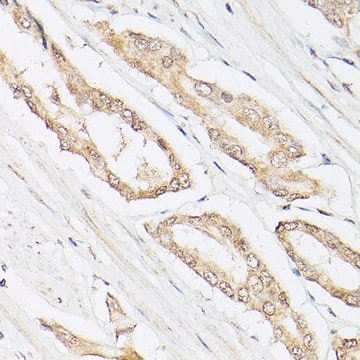M6818
Anti-MeCP2 antibody, Mouse monoclonal
clone Mec-168, purified from hybridoma cell culture
About This Item
Produits recommandés
Source biologique
mouse
Niveau de qualité
Conjugué
unconjugated
Forme d'anticorps
purified from hybridoma cell culture
Type de produit anticorps
primary antibodies
Clone
Mec-168, monoclonal
Forme
buffered aqueous solution
Poids mol.
antigen ~75 kDa
Espèces réactives
rat, human, mouse
Conditionnement
antibody small pack of 25 μL
Technique(s)
immunocytochemistry: suitable
indirect ELISA: suitable
microarray: suitable
western blot: 0.1-0.2 μg/mL using nuclear cell extract of cultured Jurkat, human acute T cell leukemia cells, or cultured MCF7 human breast carcinoma.
Isotype
IgG1
Numéro d'accès UniProt
Conditions d'expédition
dry ice
Température de stockage
−20°C
Modification post-traductionnelle de la cible
unmodified
Informations sur le gène
human ... MECP2(4204)
mouse ... Mecp2(17257)
rat ... Mecp2(29386)
Description générale
Immunogène
Application
Immunoprecipitation (1 paper)
Western Blotting (1 paper)
- immunoblotting
- immunoprecipitation
- immunostaining
- enzyme linked immunosorbent assay (ELISA)
- immunocytochemistry
- western blot (0.1-0.2 μg/mL using nuclear cell extract of cultured Jurkat, human acute T cell leukemia cells, or cultured MCF7 human breast carcinoma)
Actions biochimiques/physiologiques
Forme physique
Clause de non-responsabilité
Vous ne trouvez pas le bon produit ?
Essayez notre Outil de sélection de produits.
En option
Code de la classe de stockage
12 - Non Combustible Liquids
Classe de danger pour l'eau (WGK)
nwg
Point d'éclair (°F)
Not applicable
Point d'éclair (°C)
Not applicable
Équipement de protection individuelle
Eyeshields, Gloves, multi-purpose combination respirator cartridge (US)
Certificats d'analyse (COA)
Recherchez un Certificats d'analyse (COA) en saisissant le numéro de lot du produit. Les numéros de lot figurent sur l'étiquette du produit après les mots "Lot" ou "Batch".
Déjà en possession de ce produit ?
Retrouvez la documentation relative aux produits que vous avez récemment achetés dans la Bibliothèque de documents.
Notre équipe de scientifiques dispose d'une expérience dans tous les secteurs de la recherche, notamment en sciences de la vie, science des matériaux, synthèse chimique, chromatographie, analyse et dans de nombreux autres domaines..
Contacter notre Service technique








